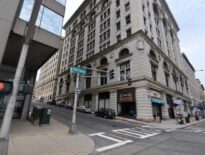
FDIC data shows Black-owned small businesses face challenges accessing credit from community banks, but the latter have opportunities to gain marketshare thanks to online lenders’ often-high fees.
As banks grapple with the ways the banking industry has contributed to longstanding racial inequalities, minority business advocates say traditional lenders also have an opportunity before them to both grow their businesses and help close the racial wealth gap.
Black-owned businesses disproportionately rely on online lenders for access to credit, FDIC statistics show, thanks to a combination of factors that include a firms’ inability to qualify for bank loans via traditional underwriting methods.
“There’s a huge market of business opportunities for those who are a little more aggressive to take advantage of it,” said Glynn Lloyd, executive director of the Boston-based Foundation for Business Equity.
Discussions around racism have pointed to systemic institutional practices in government and business that have contributed to inequalities and a wealth gap in the U.S. Addressing these issues has become a key priority for many institutions.
“I’m thrilled that the world is focusing on this – I feel like the clouds have opened and the sun is starting to come on this topic,” said Teri Williams, president and chief operating officer of Boston-based OneUnited Bank, the country’s largest Black-owned bank. “It’s unfortunate that it came because of George Floyd[‘s death in Minneapolis police custody], and it is more than George Floyd and even more than even criminal justice, it was the compounding of a lot of things that led America and globally to focus on the issue of systemic racism.”
COVID Grew Challenges
Small business owners of color continue to face significant hurdles as Massachusetts and the nation push through the COVID-19 recession.
And the pandemic has continued to show racial disparities. The Cambridge-based National Bureau of Economic Research in July reported that the number of active business owners had dropped by 3.3 million, or 22 percent between February and April. For African American businesses, the drop was 41 percent.
Williams said with the rapid closure of Black-owned businesses since the pandemic started, the financial industry still needs to figure out how community banks like OneUnited can take risks with small business lending in a safe and sound manner.
The importance of getting it right is clear. The legacies of slavery, discrimination in federally-backed mortgage programs after World War II, redlining and other factors have meant that white families are three times more likely to transfer wealth between generations as Black families are, as a Boston Consulting Group report noted in June. Black households also lack access to credit at nearly twice the rate of white households, BCG reported, and Black-owned businesses get turned down for bank financing twice as often as white businesses, limiting their ability to help Black communities build wealth.
Banks Missing Out?
With both racial injustice and the pandemic placing a focus on challenges faced by small businesses, lenders have opportunities to expand their customer bases into these communities.
But some of the same historical issues that have led to the racial wealth gap also affect Black business owners’ ability to meet underwriting standards, said the Foundation for Business Equity’s Lloyd.
The FDIC’s 2020 Small Business Credit Survey shows that 17 percent of the country’s Black-owned small businesses regularly rely on financial products from online lenders, 16 percent from small banks and 53 percent from large banks. But the survey, which was administered over the third and fourth quarters of 2019, also showed that nearly 46 percent of Black-owned small businesses sought credit from online lenders, 43 percent from large banks and 27 percent applied to small banks.
The survey found that 45 percent of Black business owners who applied for credit from online lenders did so despite sometimes-high borrowing costs because they had been denied by other lenders.
“A lot of these really good operators, really smart business folks, who actually have survived against the odds, have these formulas stacked up against them,” Lloyd said. “Yet they’re good investments, whether it be debt or equity, but the connections are not being made.”
While the wealth gap means Black business owners often lack the necessary collateral, Lloyd said, lenders looking at the business owner, business fundamentals and potential for future cash flow could find opportunities to work with these customers, including with products targeting the earlier stages of an firm’s growth.
Malia Lazu, who recently left her role as a regional president at Berkshire Bank, said banks need to be willing to adjust their products and services to meet needs of Black business owners. But banks also need to be sure their culture is ready for the change.
“Once you know that you’re ready to enter this new market, you want to view it as any other new market,” Lazu said. “You have to have things that they care about, and you have to have a product set they can use.”
Can’t Do It Alone
Since George Floyd’s death, OneUnited Bank has added 60,000 new customers. Currently the largest Black-owned bank in the U.S. with nearly $685 million in assets as of June 30, OneUnited has branches in downtown Boston, Roxbury, Dorchester, Miami and Los Angeles.
In addition to new customers, OneUnited recently received a $10 million deposit from Biogen and $5 million from Microsoft. Williams said the bank is looking to improve customer service and self-service, expand modules on its website that will help make financial literacy a core value in Black households, and improve technology, including for online mortgage applications.

Diane McLauglin
OneUnited also plans to expand opportunities for small business lending, but she added that banks cannot close the racial wealth gap on their own. OneUnited’s experiences trying to qualify Black-owned businesses for PPP loans showed many needed more technical assistance, especially with their back–office operations. She added that municipalities need to be more willing to hire Black business owners as contractors.
Williams said the current moment is critical for addressing the wealth gap since there are more people today that now understand the issues than in the past.
“I am very optimistic that we will see long lasting change,” Williams said. “I’m very, very optimistic.”




 |
| 
